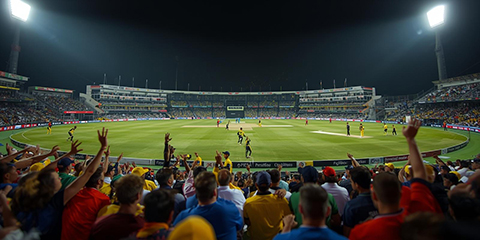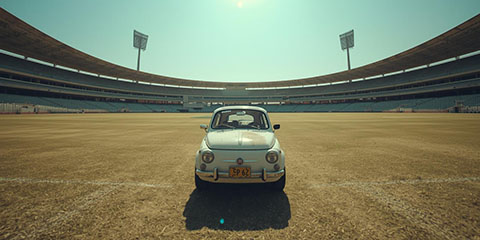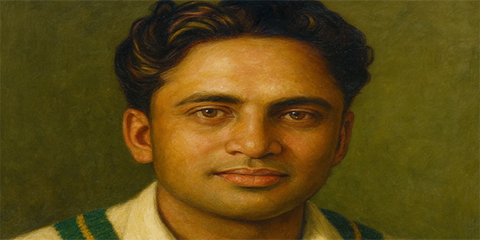Pakistan's Flying Horse: How Samiullah Khan changed hockey forever
JournalismPakistan.com | Published 7 months ago | Dr. Nauman Niaz (TI)
Join our WhatsApp channel
Some stories begin with goals and end with medals. And then there are stories like that of Samiullah Khan, where the medals are incidental, the goals are formal, and the real tale lies in the way the body moves, the way the game changes shape around a man who turns turf into theatre.
To call him ‘The Flying Horse’ almost misses the point. No one indeed glided across a hockey field like he did. But more than the velocity, it was the intention behind the movement that left the spectators awestruck, his speed had a purpose, his dodges were dialogue, and his runs felt less like strategy and more like scripture being recited in fast-forward. If Motiullah, his uncle, was the quiet calligraphy of early Pakistani hockey, then Samiullah was its sweeping flourish, a final stroke that made the entire landscape come alive.
But to begin with, Samiullah would be dishonest. One must go further back, to Rome, in 1960. Back when the world was still black-and-white and the notion of a Pakistani hockey team reigning supreme was still fresh, still becoming. That team won gold. But more than that, they became gold, burnished, heavy with promise, and luminous enough to cast a shadow across generations.
Motiullah was there. Not as a talisman. Not as a thunderclap. But as the kind of genius that whispers rather than roars. He was delicate where others were decisive, measured where others muscled through. If you watched him closely, you saw not just a left-out but a left-hand calligrapher writing new language into the sport. And the language stuck. It spread like folklore: short passes, vision at the periphery, soft wrists, and an almost invisible elegance.
Motiullah didn’t know he was starting a bloodline. In sports, we often invent legacy after the fact. But here, we are almost compelled to see design in hindsight. For in Bahawalpur, a land of dust storms and still afternoons, a young Samiullah must have absorbed Motiullah’s legend like osmosis, not with deliberate learning, but by proximity, by inheritance, by breathing in that very air.
By the time Samiullah emerged, hockey had changed. It was faster, more global, more physical. And yet, here was this Pakistani winger who brought to it an otherness, he glided when others ran. He didn’t so much dodge as disappear from the defender’s line of sight. Watching him was like watching a secret being kept from the rest of the world. The turf barely registered his touch, but the scoreboard often did.
His game was myth and metaphor. He wasn’t just a left-winger; he was the idea of a left-winger. He was not merely fast; he carried speed like silence. He didn’t need elaborate tactics, his movement was enough to redraw the dynamics and spread of the game. Like a poet who doesn’t write lines but leaves pauses that linger, Samiullah created space, literal and imagined. His burst down the flank, the feint, the swerve, and that final pass or finish, were the lines of Pakistan’s hockey elegiac expression in the 70s and early 80s.
In Montreal, they won bronze. In Buenos Aires, they took the World Cup in 1978. In Delhi, they repeated the triumph in 1982. But to define Samiullah’s career by the medals would be like reducing Faiz to his newspaper columns. His value lay elsewhere, in memory, in movement, in myth.
He retired while still captain. As if he knew. As if the story had already been told, and to stay longer would be to dilute its libretti. Leadership was never about speeches or systems. He led by carrying the game on his shoulders and letting others watch him rewrite its grammar. Later, he managed the side. Then he left. Sports always forget. But not entirely. There remains something in our imagination, in the national memory, of a man who once flew.
And what of the thread that connects Motiullah to Samiullah? It is not just lineage. It is philosophy. A belief in the beauty of the game, in its musicality, in playing not just to win but to reveal, to show the crowd something they hadn’t known was possible. To conjure a move so impossible it became spiritual. Pakistani hockey is not what it once was. The flows have slowed, and the glory days dimmed. But if you listen carefully, very carefully, you can still hear the faint echo of studs brushing against the turf, a flash of green and gold darting past defenders, and a moment where time itself seems to pause as if to say, Samiullah passed this way. Some ran fast, and some ran with purpose. And then there was Samiullah Khan, who did both and still seemed to hover just slightly above the earth.
Born in the sun-scorched stillness of Bahawalpur in 1951, Samiullah was no ordinary boy. He came from a lineage soaked in hockey, Motiullah, his uncle, had already won Olympic gold in Rome. But bloodlines, even golden ones, do not guarantee myth. That must be earned. Or perhaps, flown into. They called him The Flying Horse. Not as a metaphor, but as an admission. For on the hockey turf, Samiullah seemed less man, more motion. A streak of green and gold, cutting through defenders like a memory one can't quite hold but never forgets. He played on the left wing, but he haunted the full length of the pitch. He didn’t just run; he left trails of disbelief in his wake.
He arrived at a time when Pakistan’s hockey wasn’t only dominant, it was doctrinal. A gospel of poise and guile. The 1970s and 1980s were their cathedral years, and Samiullah was one of its most luminous priests. His ball control was almost spiritual, feet moving at speeds the eye struggled to follow, and yet the stick never lost its conversation with the ball. It was a relationship of trust, forged over years, and made visible in milliseconds.
Montreal, 1976. Bronze. Not quite the apex, but a reminder of presence. Kuala Lumpur, 1975: silver at the World Cup, a bruised but brilliant campaign. Then, the crescendo: Buenos Aires, 1978. A gold medal won with such command that it seemed Pakistan was not playing opponents, but orchestrating fate. Delhi, 1982: another World Cup, another gold. The Asian Games followed suit, Tehran, Bangkok, and Delhi again. At each venue, the same story played out: Samiullah turning full-backs into statues, cutting through teams like a hot monsoon wind.
His game was never just about goals, though he scored many. It was about the run before the goal, the way he bent time, twisted geometry, and then, like a magician done with his trick, vanished behind applause. There was something ineffable in his dodges, something almost unfair in the way he broke rhythm only to reassert it on his terms. But what truly set Samiullah apart was how he carried his team. In 1982, he became captain, and even then, he ran. Not away from responsibility, but ahead of it. He retired the same year. Like all good poems, his career ended before repetition could dull its beauty.
That might have been the end. But in Pakistan, legends rarely retire, they are summoned. In 2005, he returned as manager. But the romance had frayed by then. The expression was drowned in politics, the turf no longer a temple. He stepped away again, this time for good. Yet his name never quite left. Because Samiullah wasn’t just a player. He was an idea, that speed could be art, that movement could be meaning. In an age where data would measure sprints and passes, Samiullah belonged to a time when the heart beat faster simply by watching.
In 1983, the state gave him the Pride of Performance. In 2014, it bestowed the Sitara-i-Imtiaz. But long before the medals were pinned, he had already fixed his name in the subconscious of a nation.
There’s a story that he once leaped so high to evade a tackle that photographers captured him mid-air, horizontal, limbs splayed like a bird. That photo was passed around like a relic. It wasn’t proof of flight. It was proof that, for a few years, we had witnessed something impossible. And called it hockey.
Dr. Nauman Niaz is the Sports Editor at JournalismPakistan.com. He is a civil award winner (Tamagha-i-Imtiaz) in Sports Broadcasting and Journalism and a regular cricket correspondent, covering 54 tours and three ICC World Cups. He has written over 3500 articles, authored 15 books, and is the official historian of Pakistan cricket (Fluctuating Fortunes IV Volumes – 2005). His signature show, Game On Hai, has received the highest ratings and acclaim.

























